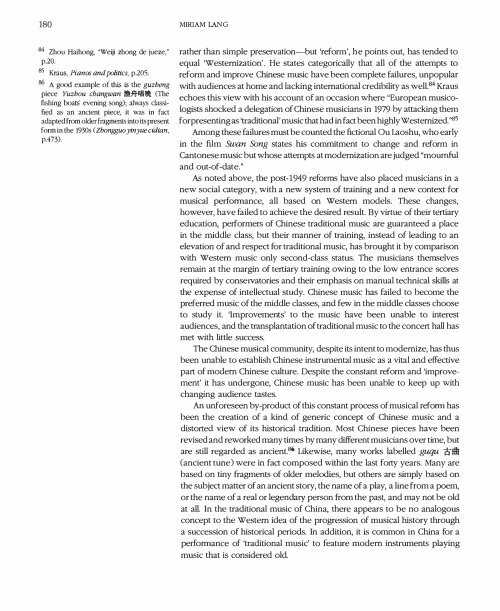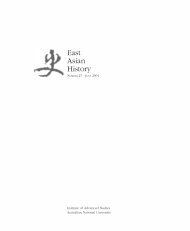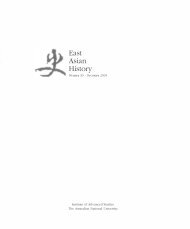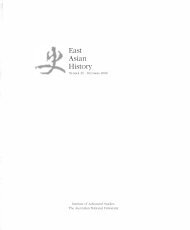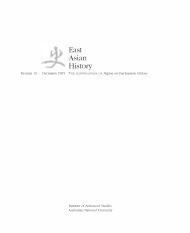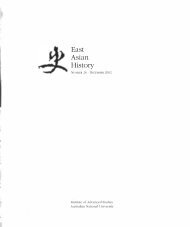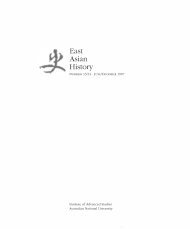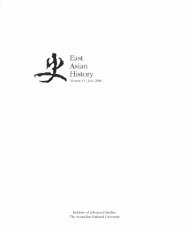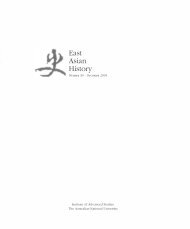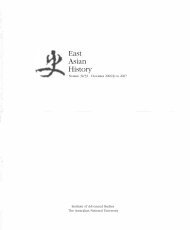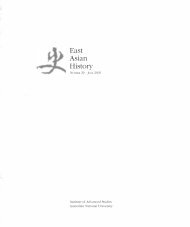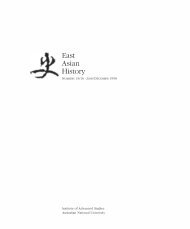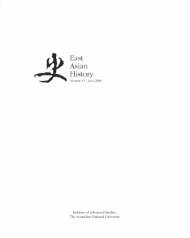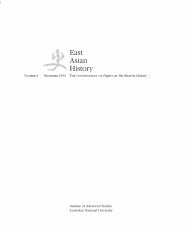Observations from a Film - (Miriam Lang) (PDF ... - East Asian History
Observations from a Film - (Miriam Lang) (PDF ... - East Asian History
Observations from a Film - (Miriam Lang) (PDF ... - East Asian History
- No tags were found...
You also want an ePaper? Increase the reach of your titles
YUMPU automatically turns print PDFs into web optimized ePapers that Google loves.
180MIRIAM LANG84 Zhou Haihong, "Weiji zhong de jueze:p.20.85 Kraus, Pianos and politics, p.205.86 A good example of this is the guzbengpiece Yuzbou cbangwan "ji} II (Thefishing boats' evening song); always classifiedas an ancient piece, it was in factadapted <strong>from</strong> older fragments into its presentform in the 1930s (Zbongguo yinyue cidian,p.473).rather than simple preservation-but 'reform', he points out, has tended toequal 'Westernization'. He states categorically that all of the attempts toreform and improve Chinese music have been complete failures, unpopularwith audiences at home and lacking international credibility as well.84 Krausechoes this view with his account of an occasion where "European musicologistsshocked a delegation of Chinese musicians in 1979 by attacking themfor presenting as 'traditional' music that had in fact been highly Westernized. "85Among these failures must be counted the fictional Ou Laoshu, who earlyin the film Swan Song states his commitment to change and reform inCantonese music but whose attempts at modernization are judged "mournfuland out-of-date."As noted above, the post-1949 reforms have also placed musicians in anew social category, with a new system of training and a new context formusical performance, all based on Western models. These changes,however, have failed to achieve the desired result. By virtue of their tertiaryeducation, performers of Chinese traditional music are guaranteed a placein the middle class, but their manner of training, instead of leading to anelevation of and respect for traditional music, has brought it by comparisonwith Western music only second-class status. The musicians themselvesremain at the margin of tertiary training owing to the low entrance scoresrequired by conservatories and their emphasis on manual technical skills atthe expense of intellectual study. Chinese music has failed to become thepreferred music of the middle classes, and few in the middle classes chooseto study it. 'Improvements' to the music have been unable to interestaudiences, and the transplantation of traditional music to the concert hall hasmet with little success.The Chinese musical community, despite its intent to modernize, has thusbeen unable to establish Chinese instrumental music as a vital and effectivepart of modem Chinese culture. Despite the constant reform and 'improvement'it has undergone, Chinese music has been unable to keep up withchanging audience tastes.An unforeseen by-product of this constant process of musical reform hasbeen the creation of a kind of generic concept of Chinese music and adistorted view of its historical tradition. Most Chinese pieces have beenrevised and reworked many times by many different musicians over time, butare still regarded as ancient.86 likewise, many works labelled guqu tid!!(ancient tune) were in fact composed within the last forty years. Many arebased on tiny fragments of older melodies, but others are simply based onthe subject matter of an ancient story, the name of a play, a line <strong>from</strong> a poem,or the name of a real or legendary person <strong>from</strong> the past, and may not be oldat all. In the traditional music of China, there appears to be no analogousconcept to the Western idea of the progression of musical history througha succession of historical periods. In addition, it is common in China for aperformance of 'traditional music' to feature modem instruments playingmusic that is considered old.


